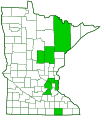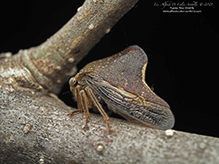treehopper
(Telamona monticola)
Conservation • Description • Habitat • Ecology • Distribution • Taxonomy
|
|
||||||||||||||
Description |
Telamona monticola is a large, easily recognized, typical treehopper. It occurs in the United States and southern Canada east of the Great Plains. It is uncommon in Minnesota based on the number of records, but it is reported as common at Cedar Creek Ecosystem Science Reserve in Anoka County. Nymphs are found from late April through mid-June. In Minnesota, adults are most active in June and July, but they may be seen from late May to early September. They are found in deciduous and mixed woodlands. They are generalist feeders, feeding on juices from the leaves and stems of a variety of trees and shrubs. These include mostly oak but also aspen, basswood, black locust, cherry, elderberry, grape, hawthorn, hickory, Virginia creeper, and willow. Adult females are 7⁄16″ (11 mm) in length. Males tend to be smaller, ⅜″ to 7⁄16″ (10 to 11 mm) in length. The plate on the thorax (pronotum) is large. It extends backward to the tip or almost to the tip of the abdomen, but it does not extend to the tip of the wings. It extends upward in a tall, narrow, squarish projection (helmet). It is usually dark brown or black, sometimes light, sometimes greenish, and it has scattered pale yellowish spots. The upper edge of the helmet is often reddish, and the rear edge is often yellow. On some individuals, the helmet is small. There are two pairs of wings, and they are held roof-like over the body when at rest. The forewings (hemelytra) are thickened, are longer than the body, and completely cover the sides of the body. They are mostly clear but are smoky brown at the tip. The veins are brown. The legs are green to brown. |
Size |
Male total length: ⅜″ to 7⁄16″ (10 to 11 mm) Female total length: 7⁄16″ (11 mm) |
Similar Species |
No similar species in Minnesota |
Habitat and Hosts |
Deciduous and mixed woodlands Trees and shrubs, including oak, aspen, basswood, black locust, cherry, elderberry, grape, hawthorn, hickory, Virginia creeper, and willow |
Ecology |
Season |
One generation per year: late May to early September |
Behavior |
|
Life Cycle |
Eggs overwinter and hatch in late April on unopened buds of host trees. They moult five times, emerging as adults in about eight weeks. |
Nymph Food |
|
Adult Food |
Plant juices |
Distribution |
||
|
Sources |
|
| 11/1/2024 | ||
Occurrence |
||
Locally common |
||
Taxonomy |
|
Order |
Hemiptera (True bugs, Hoppers, Aphids, and Allies) |
Suborder |
Auchenorrhyncha (true hoppers) |
Infraorder |
Cicadomorpha (spittlebugs, cicadas, leafhoppers and treehoppers) |
Superfamily |
Membracoidea (leafhoppers and treehoppers) |
Family |
|
Subfamily |
|
Tribe |
Telamonini |
Genus |
Telamona |
Subordinate Taxa |
|
|
|
Synonyms |
|
Membracis monticola Telamona brunneipennis Telamona irrorata Telamona querci |
|
Common Names |
|
This species has no common name. The common name of the Family Membracidae is typical treehoppers, and it is applied here for convenience. |
|
Glossary
Hemelytron
The forewing of true bugs (order Hemiptera), thickened at the base and membranous at the tip. Plural: hemelytra.
Pronotum
The exoskeletal plate on the upper side of the first segment of the thorax of an insect.
Visitor Photos |
||
Share your photo of this insect. |
||
This button not working for you? |
||
Alfredo Colon |
||
 |
||
MinnesotaSeasons.com Photos |
||
|
||
|
||

Slideshows |
|

Visitor Videos |
||
Share your video of this insect. |
||
This button not working for you? |
||
|
Other Videos |
||
|

Created: 11/22/2023 Last Updated: © MinnesotaSeasons.com. All rights reserved. |




